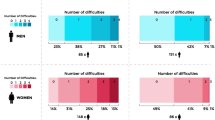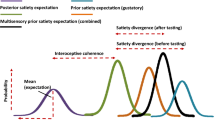Abstract
Perfectionistic traits have been associated with stronger weight and diet concerns. Maladaptive perfectionism is tied to critical evaluation tendencies such as excessive concern about making mistakes, increasing one’s risk for eating disorder pathology. Knowledge about healthy diet and nutrition may be one factor influencing associations between perfectionistic tendencies, as individuals with eating disorders may be more attuned to sources of nutrients. The current study examined whether nutrition knowledge moderates the association between one facet of perfectionism, concern over mistakes, and shape/weight concerns and the association between concern over mistakes and global eating pathology. College women (N = 122) completed questionnaires on disordered eating attitudes, nutrition knowledge, and perfectionism. Concern over mistakes was positively related to shape/weight concerns and global eating pathology. Nutrition knowledge significantly moderated the association between concerns over mistakes and shape/weight concerns, such that the association was stronger among those with higher levels of nutrition knowledge. Furthermore, nutrition knowledge displayed trend-level significance for the moderation of the association between concern over mistakes and global eating pathology. College women displaying high levels of concern over mistakes who are more informed about nutrition knowledge may be more vulnerable to developing concerns about body shape/weight and eating disorder pathology.
This is a preview of subscription content, access via your institution
Access options
Subscribe to this journal
Receive 12 print issues and online access
$259.00 per year
only $21.58 per issue
Buy this article
- Purchase on Springer Link
- Instant access to full article PDF
Prices may be subject to local taxes which are calculated during checkout


Similar content being viewed by others
Data availability
Data will be made available upon reasonable request.
References
American Psychiatric Association. Diagnostic and statistical manual of mental disorders (DSM-5®). American Psychiatric Pub; 2013.
Jacobi C, Hayward C, de Zwaan M, Kraemer HC, Agras WS. Coming to terms with risk factors for eating disorders: application of risk terminology and suggestions for a general taxonomy. Psychol Bull. 2004;130:19–65.
Killen JD, Taylor CB, Hayward C, Haydel KF, Wilson DM, Hammer L, et al. Weight concerns influence the development of eating disorders: a 4-year prospective study. J Consult Clin Psychol. 1996;64:936–40.
Geller J, Johnston C, Madsen K. The role of shape and weight in self-concept: the shape and weight based self-esteem inventory. Cogn Ther Res. 1997;21:5–24.
Geller J, Johnston C, Madsen K, Goldner EM, Remick RA, Birmingham CL. Shape- and weight-based self-esteem and the eating disorders. Int J Eat Disord. 1998;24:285–98.
Cooper PJ, Goodyer I. Prevalence and significance of weight and shape concerns in girls aged 11-16 years. Br J Psychiatry. 1997;171:542–4.
Frost RO, Marten P, Lahart C, Rosenblate R. The dimensions of perfectionism. Cogn Ther Res. 1990;14:449–68.
Gulker MG, Laskis TA, Kuba SA. Do excessive exercisers have a higher rate of obsessive-compulsive symptomatology? Psychol Health Med. 2001;6:387–98.
Brosof LC, Levinson CA. Social appearance anxiety and dietary restraint as mediators between perfectionism and binge eating: a six month three wave longitudinal study. Appetite. 2017;108:335–42.
Bulik CM, Tozzi F, Anderson C, Mazzeo SE, Aggen S, Sullivan PF. The relation between eating disorders and components of perfectionism. Am J Psychiatry. 2003;160:366–8.
Halmi KA, Sunday SR, Strober M, Kaplan A, Woodside DB, Fichter M, et al. Perfectionism in anorexia nervosa: variation by clinical subtype, obsessionality, and pathological eating behavior. Am J Psychiatry. 2000;157:1799–805.
Lilenfeld LRR, Stein D, Bulik CM, Strober M, Plotnicov K, Pollice C, et al. Personality traits among currently eating disordered, recovered and never ill first-degree female relatives of bulimic and control women. Psychological Med. 2000;30:1399–410.
Shafran R, Cooper Z, Fairburn CG. Clinical perfectionism: a cognitive-behavioural analysis. Behav Res Ther. 2002;40:773–91.
Donovan CL, Chew D, Penny R. Perfecting weight restriction: the moderating influence of body dissatisfaction on the relationship between perfectionism and weight control practices. Behav Change. 2014;31:189–204.
Wade TD, Tiggemann M. The role of perfectionism in body dissatisfaction. J Eat Disord. 2013;1:2.
Ho ASL, Soh NL, Walter G, Touyz S. Comparison of nutrition knowledge among health professionals, patients with eating disorders and the general population. Nutr Diet. 2011;68:267–72.
Dancyger IF, Garfinkel PE. The relationship of partial syndrome eating disorders to anorexia nervosa and bulimia nervosa. Psychological Med. 1995;25:1019–25.
Tylka TL, Subich LM. Exploring the construct validity of the eating disorder continuum. J Couns Psychol. 1999;46:268.
Qualtrics I. Qualtrics. Provo, UT; 2013.
Fairburn CG, Beglin SJ. Eating Disorder Examination Questionnaire. Cogn Behav Ther Eat Disord. 2008;309:313.
Berg PCB, Frazier P, Crow SJ. Psychometric evaluation of the eating disorder examination and eating disorder examination-questionnaire: a systematic review of the literature. Int J Eat Disord. 2012;45:428–38.
Luce KH, Crowther JH. The reliability of the Eating Disorder Examination-Self-Report Questionnaire Version (EDE-Q). Int J Eat Disord. 1999;25:349–51.
Fairburn CG, Beglin SJ. Assessment of eating disorders: interview or self-report questionnaire? Int J Eat Disord. 1994;16:363–70.
Spanos A, Burt SA, Klump KL. Do weight and shape concerns exhibit genetic effects? Investigating discrepant findings. Int J Eat Disord. 2010;43:29–34.
Wade T, Martin NG, Tiggemann M. Genetic and environmental risk factors for the weight and shape concerns characteristic of bulimia nervosa. Psychol Med. 1998;28:761–71.
Wade TD, Zhu G, Martin NG. Undue influence of weight and shape: is it distinct from body dissatisfaction and concern about weight and shape? Psychol Med. 2011;41:819–28.
Parmenter K, Wardle J. Development of a General Nutrition Knowledge Questionnaire for adults. Eur J Clin Nutr. 1999;53:298–308.
Hendrie GA, Coveney J, Cox D. Exploring nutrition knowledge and the demographic variation in knowledge levels in an Australian community sample. Public Health Nutr. 2008;11:1365–71.
Mazzeo SE, Slof‐Op’t Landt MCT, Jones I, Mitchell K, Kendler KS, Neale MC, et al. Associations among postpartum depression, eating disorders, and perfectionism in a population‐based sample of adult women. Int J Eat Disord. 2006;39:202–11.
Tozzi F, Aggen SH, Neale BM, Anderson CB, Mazzeo SE, Neale MC, et al. The structure of perfectionism: a twin study. Behav Genet. 2004;34:483–94.
Bardone-Cone AM, Weishuhn AS, Boyd CA. Perfectionism and bulimic symptoms in African American college women: dimensions of perfectionism and their interactions with perceived weight status. J Counseling Psychol. 2009;56:266.
Castro JR, Rice KG. Perfectionism and ethnicity: implications for depressive symptoms and self-reported academic achievement. Cult Divers Ethnic Minor Psychol. 2003;9:64–78.
Sassaroli S, Apparigliato M, Bertelli S, Boccalari L, Fiore F, Lamela C, et al. Perfectionism as a mediator between perceived criticism and eating disorders. Eat Weight Disord. 2011;16:37–44.
Enders CK. Applied missing data analysis. Guilford Press; 2010.
Schafer JL, Graham JW. Missing data: our view of the state of the art. Psychol Methods. 2002;7:147.
IBM Corp. IBM SPSS statistics for Macintosh, version 25.0. Armonk, NY: IBM Corp; 2017.
Hayes AF. Introduction to mediation, moderation, and conditional process analysis: a regression-based approach. Guilford Publications; 2017.
Arcelus J, García-Dantas A, Sánchez-Martín M, Sánchez CDR. Influence of perfectionism on variables associated to eating disorders in dance students. Rev Psicol Deporte. 2015;24:297–303.
Kaye WH, Lilenfeld LR, Berrettini WH, Strober M, Devlin B, Klump KL, et al. A search for susceptibility loci for anorexia nervosa: methods and sample description. Biol Psychiatry. 2000;47:794–803.
Fairburn CG, Cooper Z, Doll HA, Welch SL. Risk factors for anorexia nervosa: three integrated case-control comparisons. Arch Gen Psychiatry. 1999;56:468–76.
Soh NL, Touyz SW, Dobbins TA, Surgenor LJ, Clarke S, Kohn MR, et al. Nutrition knowledge in young women with eating disorders in Australia and Singapore: a pilot study. Aust N Z J Psychiatry. 2009;43:1178–84.
Goossens L, Soenens B, Braet C. Prevalence and characteristics of binge eating in an adolescent community sample. J Clin Child Adolesc Psychol. 2009;38:342–53.
Kashubeck-West S, Mintz LB, Weigold I. Separating the effects of gender and weight-loss desire on body satisfaction and disordered eating behavior. Sex Roles. 2005;53:505–18.
Matthews M, Zullig KJ, Ward RM, Horn T, Huebner ES. An analysis of specific life satisfaction domains and disordered eating among college students. Soc Indic Res. 2012;107:55–69.
Striegel-Moore RH, Bulik CM. Risk factors for eating disorders. Am Psychol. 2007;62:181.
Tata P, Fox J, Cooper J. An investigation into the influence of gender and parenting styles on excessive exercise and disordered eating. Eur Eat Disord Rev. 2001;9:194–206.
Thompson RA, Trattner, Sherman R. Athletes, athletic performance, and eating disorders: healthier alternatives. J Soc Issues. 1999;55:317–37.
Woodside DB, Bulik CM, Halmi KA, Fichter MM, Kaplan A, Berrettini WH, et al. Personality, perfectionism, and attitudes toward eating in parents of individuals with eating disorders. Int J Eat Disord. 2002;31:290–9.
Frost RO, Heimberg RG, Holt CS, Mattia JI, Neubauer AL. A comparison of two measures of perfectionism. Personal Individ Differ. 1993;14:119–26.
Cordery H, Waller G. Nutritional knowledge of health care professionals working in the eating disorders. Eur Eat Disord Rev. 2006;14:462–7.
Author information
Authors and Affiliations
Corresponding author
Ethics declarations
Conflict of interest
The authors declare that they have no conflict of interest.
Additional information
Publisher’s note Springer Nature remains neutral with regard to jurisdictional claims in published maps and institutional affiliations.
Rights and permissions
About this article
Cite this article
Schwartz, N.E., Hecht, L.M. & Haedt-Matt, A.A. Nutrition knowledge moderates the association between perfectionism and shape/weight concerns. Eur J Clin Nutr 75, 1433–1439 (2021). https://doi.org/10.1038/s41430-021-00866-w
Received:
Revised:
Accepted:
Published:
Issue Date:
DOI: https://doi.org/10.1038/s41430-021-00866-w



